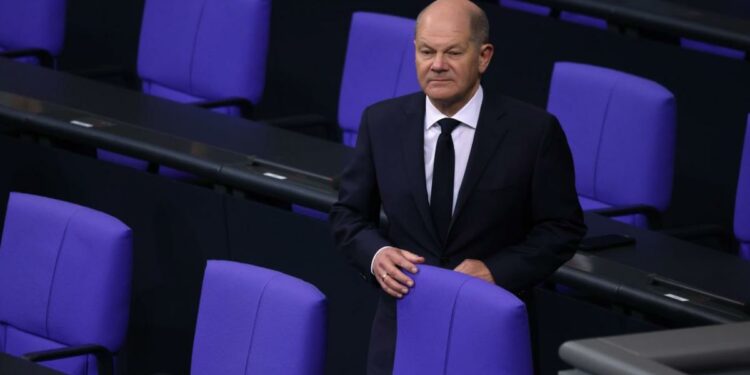Donald Trump’s re-election has sent political shockwaves across the Atlantic, pushing Germany — Ukraine’s second-largest donor — into a decisive moment. The election has intensified internal divides and sparked a reckoning over Germany’s role in European security. For years, German leaders deferred tough decisions on Ukraine, relying on U.S. leadership to navigate international crises. But Trump’s isolationist rhetoric and unpredictable foreign policy have disrupted that balance, forcing Berlin to confront its priorities. The fallout has already upended Germany’s ruling coalition, setting the stage for early elections in February.
At the heart of this crisis is a budgetary impasse that exposes deep divisions within Germany’s coalition government over how to address economic stagnation, inflation, and the ongoing Russo-Ukrainian war. Trump’s victory raised urgent questions about Germany’s capacity — and willingness — to lead Europe in the face of Russian aggression.
Germany’s recent political turmoil stems from a long-standing constitutional constraint: the “debt brake,” which limits public borrowing. The Social Democrats (SPD) and Greens, part of the country’s ruling coalition, pushed for loosening these rules to counter economic stagnation and fund critical programs, including aid for Ukraine. The fiscally conservative Free Democrats (FDP), the coalition’s third component, resisted, insisting on strict adherence to fiscal discipline.
Read also: Opinion: With soaring interest rates and stagflation risks, Russia will face deep economic crisis regardless of war’s outcome
While the coalition eventually agreed to breach the debt brake under extraordinary circumstances — such as a dramatic escalation in Ukraine — Trump’s return tipped the scales. His re-election reignited fears of a more isolationist U.S., prompting Chancellor Olaf Scholz to frame Trump’s victory as a “fundamental change” that demanded increased military and financial commitments to Ukraine. Yet, these proposals met resistance from the FDP, which suggested alternative funding mechanisms, such as using frozen Russian assets. The standoff proved insurmountable, leading to the coalition’s collapse.
Scholz has consistently emphasized Germany’s 30 billion euros ($31.7 billion) in aid to Ukraine, framing the support as vital for both European security and long-term stability. “A Russian victory would cost us much more,” he asserted in a televised address following the coalition’s collapse. However, his actions often fell short of his rhetoric. Over the past two years, Germany’s contributions to Ukraine — including tanks, air defense systems, and humanitarian aid — have been incremental and politically contentious. Key military systems, like Taurus missiles, remain undelivered despite growing calls for stronger support.
Public opinion has also shifted. Far-left and far-right voices now question the cost of the war, advocating negotiations with Russia. Parties like the far-left Bündnis Sarah Wagenknecht and the far-right Alternative für Deutschland (AfD) have gained traction, particularly in economically weaker regions, by appealing to voters frustrated with rising gas prices and prolonged military involvement. Meanwhile, Germany’s mainstream parties have struggled to articulate a clear endgame for the war or its broader implications.
Far-left and far-right voices now question the cost of the war, advocating negotiations with Russia, while Germany’s mainstream parties have struggled to articulate a clear endgame for the war or its broader implications.
German Chancellor Olaf Scholz (R) walks with Ukrainian President Volodymyr Zelensky (L) after he arrives at the Chancellery in Berlin, Germany, on Oct. 11, 2024. (Sean Gallup/Getty Images)
Trump’s re-election has thrust Germany into an uncomfortable spotlight, forcing it to reassess its reliance on U.S. leadership. For Ukrainians, who have tirelessly campaigned for German military support, this moment feels both urgent and uncertain. Activists continue to demand the delivery of advanced systems, like the Taurus missile, which could change the trajectory of the war. Yet Germany’s hesitancy remains, with many decisions still tied to Washington’s lead.
The upcoming February elections could mark a decisive shift. Conservatives, currently leading in polls, have signaled stronger support for Ukraine, including commitments to deliver more military aid if Russian attacks on civilians persist. However, there’s a catch: If the SPD joins the next government as a junior coalition partner, its pacifist leanings could again temper Germany’s response at a critical juncture.
Read also: Opinion: Europe’s 2% defense benchmark is an illusion, not a solution
Even within the SPD, opinions are evolving. German Defense Minister Boris Pistorius recently acknowledged that Germany must become “ready for war,” signaling a potential shift in the party’s stance. Yet Scholz’s recent phone call with Russian President Vladimir Putin — criticized by Ukrainian President Volodymyr Zelensky as “opening Pandora’s box” — underscores the precariousness of Germany’s position.
Trump’s return to power has exposed Germany’s vulnerabilities and its dependence on American leadership. The collapse of its coalition government is both a symptom and a consequence of these pressures, as economic, political, and geopolitical challenges collide. Germany now faces a stark choice: step into a leadership role in supporting Ukraine or remain reactive, paralyzed by internal divisions and external unpredictability.
The February elections will be pivotal in determining Germany’s future course. While a conservative-led government could bring renewed vigor to Ukraine’s cause, the specter of continued SPD influence looms large. For Europe, this moment demands bold action and a departure from past hesitations. For Germany, it’s an opportunity to define its legacy — not as a reluctant actor, but as a leader shaping a new chapter for Ukraine and Europe.
Editor’s Note: The opinions expressed in the op-ed section are those of the authors and do not necessarily reflect the views of the Kyiv Independent.
Submit an Opinion
Shop now
We’ve been working hard to bring you independent, locally-sourced news from Ukraine. Consider supporting the Kyiv Independent.
Source link : http://www.bing.com/news/apiclick.aspx?ref=FexRss&aid=&tid=67429c96fdc140789a976b70e6910945&url=https%3A%2F%2Fwww.yahoo.com%2Fnews%2Fopinion-berlins-coalition-drama-puts-161432718.html&c=7418635812226993757&mkt=de-de
Author :
Publish date : 2024-11-22 08:14:00
Copyright for syndicated content belongs to the linked Source.



